2018高考真题英语全国2卷
英语高考“七选五”阅读理解真题详解2
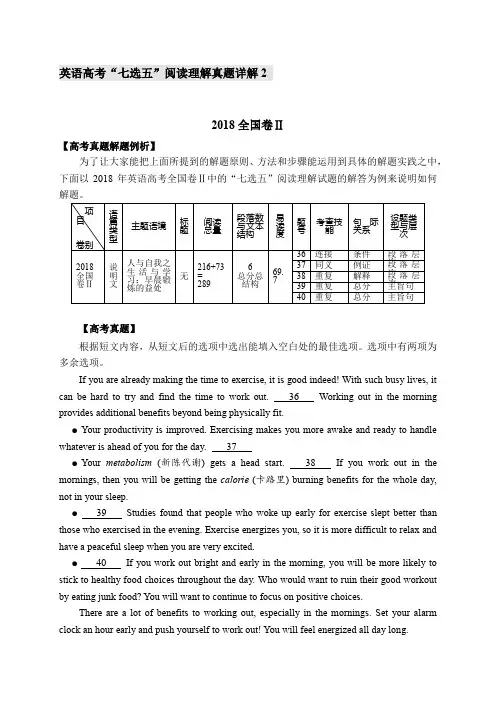
英语高考“七选五”阅读理解真题详解22018全国卷Ⅱ【高考真题解题例析】为了让大家能把上面所提到的解题原则、方法和步骤能运用到具体的解题实践之中,下面以2018年英语高考全国卷Ⅱ中的“七选五”阅读理解试题的解答为例来说明如何解题。
【高考真题】根据短文内容,从短文后的选项中选出能填入空白处的最佳选项。
选项中有两项为多余选项。
If you are already making the time to exercise, it is good indeed! With such busy lives, it can be hard to try and find the time to work out. 36 Working out in the morning provides additional benefits beyond being physically fit.●Your productivity is improved. Exercising makes you more awake and ready to handle whatever is ahead of you for the day. 37●Your metabolism(新陈代谢) gets a head start. 38 If you work out in the mornings, then you will be getting the calorie (卡路里) burning benefits for the whole day, not in your sleep.●39 Studies found that people who woke up early for exercise slept better than those who exercised in the evening. Exercise energizes you, so it is more difficult to relax and have a peaceful sleep when you are very excited.●40 If you work out bright and early in the morning, you will be more likely to stick to healthy food choices throughout the day. Who would want to ruin their good workout by eating junk food? You will want to continue to focus on positive choices.There are a lot of benefits to working out, especially in the mornings. Set your alarm clock an hour early and push yourself to work out! You will feel energized all day long.A. You will stick to your diet.B. Your quality of sleep improves.C. You prefer healthy food to fast food.D. There is no reason you should exercise in the morning.E. You can keep your head clear for 4-10 hours after exercise.F. After you exercise, you continue to burn calories throughout the day.G. If you are planning to do exercise regularly, or you’re doing it now, then listen up!【解题过程】第一步,快速浏览文章与选项,判定语篇类型、主题语境和篇章结构。
2018英语真题(新课标ⅱ)(含答案解析版)
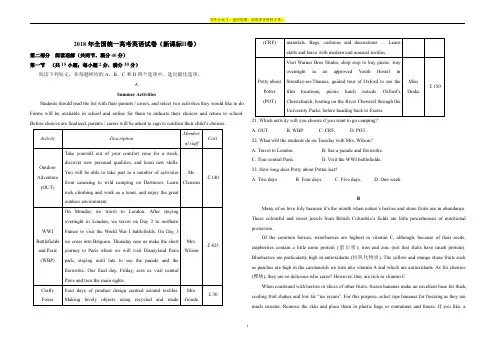
2018年全国统一高考英语试卷(新课标Ⅱ卷)第二部分阅读理解(共两节,满分40分)第一节(共15小题;每小题2分,满分30分)阅读下列短文,从每题所给的A、B、C和D四个选项中,选出最佳选项。
ASummer ActivitiesStudents should read the list with their parents/carers,and select two activities they would like to do. Forms will be available in school and online for them to indicate their choices and return to school. Before choices are finalized,parents/carers will be asked to sign to confirm their child’s choices.Activity Description Memberof staffCostOutdoor Adventure (OUT)Take yourself out of your comfort zone for a week,discover new personal qualities,and learn new skills.You will be able to take part in a number of activitiesfrom canoeing to wild camping on Dartmoor.Learnrock climbing and work as a team,and enjoy the greatoutdoor environment.Mr.Clemens£140WWI Battlefields and Paris (WBP)On Monday we travel to London.After stayingovernight in London,we travel on Day2to northernFrance to visit the World War I battlefields.On Day3we cross into Belgium.Thursday sees us make the shortjourney to Paris where we will visit Disneyland Parispark,staying until late to see the parade and thefireworks.Our final day,Friday,sees us visit centralParis and tour the main sights.Mrs.Wilson£425Crafty Foxes Four days of product design centred around textiles.Making lovely objects using recycled and madeMrs.Goode£30(CRF)materials.Bags,cushions and decorations…Learnskills and leave with modern and unusual textiles.Potty aboutPotter(POT)Visit Warner Bros Studio,shop stop to buy picnic,stayovernight in an approved Youth Hostel inStreatley-on-Thames,guided tour of Oxford to see thefilm locations,picnic lunch outside Oxford’sChristchurch,boating on the River Cherwell through theUniversity Parks,before heading back to Exeter.MissDrake£15021.Which activity will you choose if you want to go camping?A.OUT.B.WBP.C.CRF.D.POT.22.What will the students do on Tuesday with Mrs.Wilson?A.Travel to London.B.See a parade and fireworks.C.Tour central Paris.D.Visit the WWI battlefields.23.How long does Potty about Potter last?A.Two days.B.Four days.C.Five days.D.One week.BMany of us love July because it’s the month when nature’s berries and stone fruits are in abundance.These colourful and sweet jewels from British Columbia’s fields are little powerhouses of nutritionalprotection.Of the common berries,strawberries are highest in vitamin C,although,because of their seeds,raspberries contain a little more protein(蛋白质),iron and zinc(not that fruits have much protein).Blueberries are particularly high in antioxidants(抗氧化物质).The yellow and orange stone fruits suchas peaches are high in the carotenoids we turn into vitamin A and which are antioxidants.As for cherries(樱桃),they are so delicious who cares?However,they are rich in vitamin C.When combined with berries or slices of other fruits,frozen bananas make an excellent base for thick,cooling fruit shakes and low fat“ice cream”.For this purpose,select ripe bananas for freezing as they aremuch sweeter.Remove the skin and place them in plastic bags or containers and freeze.If you like,asqueeze of fresh lemon juice on the bananas will prevent them turning brown.Frozen bananas will last several weeks,depending on their ripeness and the temperature of the freezer.If you have a juicer,you can simply feed in frozen bananas and some berries or sliced fruit.Out comes a“soft-serve”creamy dessert,to be eaten right away.This makes a fun activity for a children’s party;they love feeding the fruit and frozen bananas into the top of the machine and watching the ice cream come out below.24.What does the author seem to like about cherries?A.They contain protein.B.They are high in vitamin A.C.They have a pleasant taste.D.They are rich in antioxidants.25.Why is fresh lemon juice used in freezing bananas?A.To make them smell better.B.To keep their colour.C.To speed up their ripening.D.To improve their nutrition.26.What is“a juicer”in the last paragraph?A.A dessert.B.A drink.C.A container.D.A machine.27.From which is the text probably taken?A.A biology textbook.B.A health magazine.C.A research paper.D.A travel brochure.CTeens and younger children are reading a lot less for fun,according to a Common Sense Media report published Monday.While the decline over the past decade is steep for teen readers,some data in the report shows that reading remains a big part of many children’s lives,and indicates how parents might help encourage more reading.According to the report’s key findings,“the proportion(比例)who say they‘hardly ever’read for fun has gone from8percent of13-year-olds and9percent of17-year-olds in1984to22percent and27 percent respectively today.”The report data shows that pleasure reading levels for younger children,ages2-8,remain largely the same.But the amount of time spent in reading each session has declined,from closer to an hour or more to closer to a half hour per session.When it comes to technology and reading,the report does little to counsel(建议)parents looking for data about the effect of e-readers and tablets on reading.It does point out that many parents still limit electronic reading,mainly due to concerns about increased screen time.The most hopeful data shared in the report shows clear evidence of parents serving as examples and important guides for their kids when it comes to reading.Data shows that kids and teens who do read frequently,compared to infrequent readers,have more books in the home,more books purchased for them, parents who read more often,and parents who set aside time for them to read.As the end of school approaches,and school vacation reading lists loom(逼近)ahead,parents might take this chance to step in and make their own summer reading list and plan a family trip to the library or bookstore.28.What is the Common Sense Media report probably about?A.Children’s reading habits.B.Quality of children’s books.C.Children’s after-class activities.D.Parent-child relationships.29.Where can you find the data that best supports“children are reading a lot less for fun”?A.In paragraph2.B.In paragraph3.C.In paragraph4.D.In paragraph5.30.Why do many parents limit electronic reading?A.E-books are of poor quality.B.It could be a waste of time.C.It may harm children’s health.D.E-readers are expensive.31.How should parents encourage their children to read more?A.Act as role models for them.B.Ask them to write book reports.C.Set up reading groups for them.D.Talk with their reading class teachers.DWe’ve all been there:in a lift,in line at the bank or on an airplane,surrounded by people who are, like us,deeply focused on their smartphones or,worse,struggling with the uncomfortable silence.What’s the problem?It’s possible that we all have compromised conversational intelligence.It’s more likely that none of us start a conversation because it’s awkward and challenging,or we think it’s annoying and unnecessary.But the next time you find yourself among strangers,consider that small talk is worth the trouble.Experts say it’s an invaluable social practice that results in big benefits.Dismissing small talk as unimportant is easy,but we can’t forget that deep relationships wouldn’t even exist if it weren’t for casual conversation.Small talk is the grease(润滑剂)for social communication,says Bernardo Carducci,director of the Shyness Research Institute at Indiana University Southeast.“Almost every great love story and each big business deal begins with small talk,”he explains.“The key to successful small talk is learning how to connect with others,not just communicate with them.”In a2014study,Elizabeth Dunn,associate professor of psychology at UBC,invited people on their way into a coffee shop.One group was asked to seek out an interaction(互动)with its waiter;the other,to speak only when necessary.The results showed that those who chatted with their server reported significantly higher positive feelings and a better coffee shop experience.“It’s not that talking to the waiter is better than talking to your husband,”say Dunn.“But interactions with peripheral(边缘的) members of our social network matter for our well-being also.”Dunn believes that people who reach out to strangers feel a significantly greater sense of belonging, a bond with others.Carducci believes developing such a sense of belonging starts with small talk.“Small talk is the basis of good manners,”he says.32.What phenomenon is described in the first paragraph?A.Addiction to smartphones.B.Inappropriate behaviours in public places.C.Absence of communication between strangers.D.Impatience with slow service.33.What is important for successful small talk according to Carducci?A.Showing good manners.B.Relating to other people.C.Focusing on a topic.D.Making business deals.34.What does the coffee-shop study suggest about small talk?A.It improves family relationships. B.It raises people’s confidence.C.It matters as much as formal talk.D.It makes people feel good.35.What is the best title for the text?A.Conversation CountsB.Ways of Making Small TalkC.Benefits of Small TalkD.Uncomfortable Silence第二节(共5小题;每小题2分,满分10分)根据短文内容,从短文后的选项中选出能填入空白处的最佳选项。
完整版)2018年春季高考英语真题
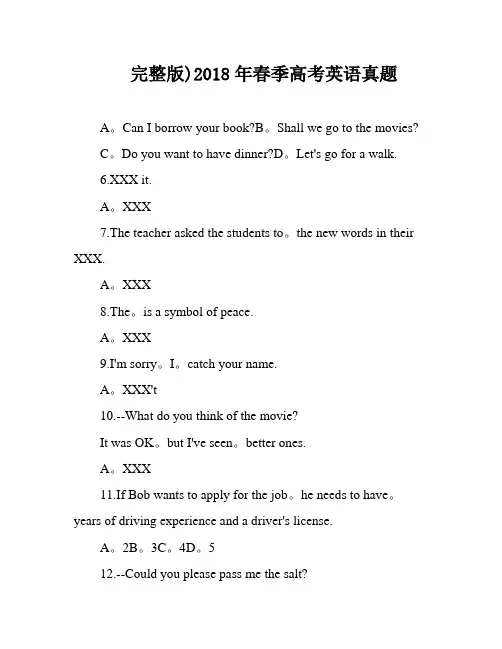
完整版)2018年春季高考英语真题A。
Can I borrow your book?B。
Shall we go to the movies?C。
Do you want to have dinner?D。
Let's go for a walk.6.XXX it.A。
XXX7.The teacher asked the students to。
the new words in their XXX.A。
XXX8.The。
is a symbol of peace.A。
XXX9.I'm sorry。
I。
catch your name.A。
XXX't10.--What do you think of the movie?It was OK。
but I've seen。
better ones.A。
XXX11.If Bob wants to apply for the job。
he needs to have。
years of driving experience and a driver's license.A。
2B。
3C。
4D。
512.--Could you please pass me the salt?Sure。
here you。
XXX13.She always。
her XXX handing it in.A。
XXX checkingD。
has checked14.The。
is a XXX.A。
XXX15.I'm sorry。
but I can't。
you with your homework right now.A。
XXX help16.--What's your favorite color?I like blue。
but I also like。
A。
XXX purple17.He was so tired that he。
asleep during the movie.A。
2018年天津英语高考真题(含答案)
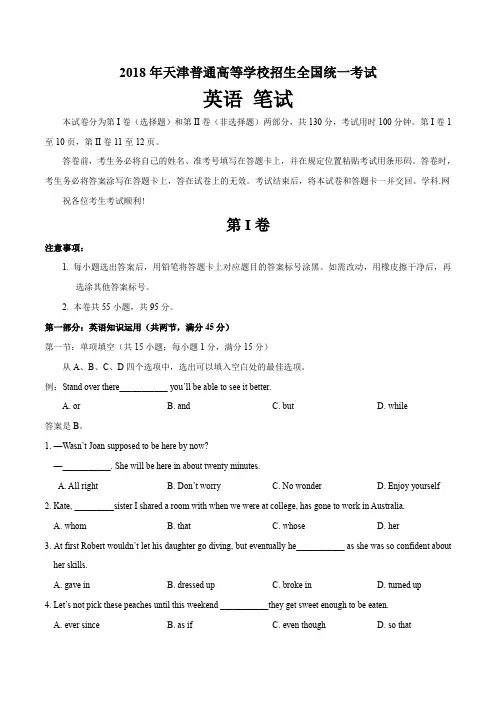
2018年天津普通高等学校招生全国统一考试英语笔试本试卷分为第I卷(选择题)和第II卷(非选择题)两部分,共130分,考试用时100分钟。
第I卷1至10页,第II卷11至12页。
答卷前,考生务必将自己的姓名、准考号填写在答题卡上,并在规定位置粘贴考试用条形码。
答卷时,考生务必将答案涂写在答题卡上,答在试卷上的无效。
考试结束后,将本试卷和答题卡一并交回。
学科.网祝各位考生考试顺利!第I卷注意事项:1. 每小题选出答案后,用铅笔将答题卡上对应题目的答案标号涂黑。
如需改动,用橡皮擦干净后,再选涂其他答案标号。
2. 本卷共55小题,共95分。
第一部分:英语知识运用(共两节,满分45分)第一节:单项填空(共15小题;每小题1分,满分15分)从A、B、C、D四个选项中,选出可以填入空白处的最佳选项。
例:Stand over there___________ you’ll be able to see it better.A. orB. andC. butD. while答案是B。
1. —Wasn’t Joan sup posed to be here by now?—___________. She will be here in about twenty minutes.A. All rightB. Don’t worryC. No wonderD. Enjoy yourself2. Kate, _________sister I shared a room with when we were at college, has gone to work in Australia.A. whomB. thatC. whoseD. her3. At first Robert wouldn’t let his daughter go diving, but eventually he___________ as she was so confident about her skills.A. gave inB. dressed upC. broke inD. turned up4. Let’s not pick these peaches until this weekend ___________they get sweet enough to be eaten.A. ever sinceB. as ifC. even thoughD. so that5. —I’m moving in a few days and I wonder if you could help.—___________. Just let me know when, an d I’ll be there.A. You betB. It dependsC. Forget itD. No kidding6. The__________ that there is life on other planets in the universe has always inspired scientists to explore the outer space.zxxkA. adviceB. orderC. possibilityD. invitation7. I need a new passport so I will have to have my photograph ___________.A. takingB. takenC. being takenD. take8. It took him a long time to___________ the skills he needed to become a good dancer.A. displayB. acquireC. teachD. test9. The gold medal will be awarded to ___________ wins the first place in the bicycle race.A. whomeverB. whereverC. whoeverD. whatever10. I can’t find my purse. I___________ it in the supermarket yesterday, but I’m not su re.A. should leaveB. must have leftC. might leaveD. could have left11. Bob thought he couldn’t go to the pa rty because he had to write a report, but he went ___________.A. at firstB. after allC. above allD. at random12. I didn’t mean ___________anything but the ice cream looked so good that I couldn’t help_______ it.A. to eat; to tryB. eating; tryingC. eating; to tryD. to eat; trying13. My washing machine ___________this week, so I have to wash my clothes by hand.A. was repairedB. is repairedC. is being repairedD. has been repaired14. It was only when the car pulled up in front of our house ___________we saw Lily in the passenger seat.A. whichB. thatC. whenD. where15. If we ___________the flight yesterday, we would be enjoying our holiday on the beach now.A. had caughtB. caughtC. have caughtD. would catch第二节:完形填空(共20小题;每小题1.5分,满分30分)阅读下面短文,掌握其大意,然后从16~35各题所给的A、B、C、D四个选项中,选出最佳选项。
往年高考英语作文真题及满分范文全汇总
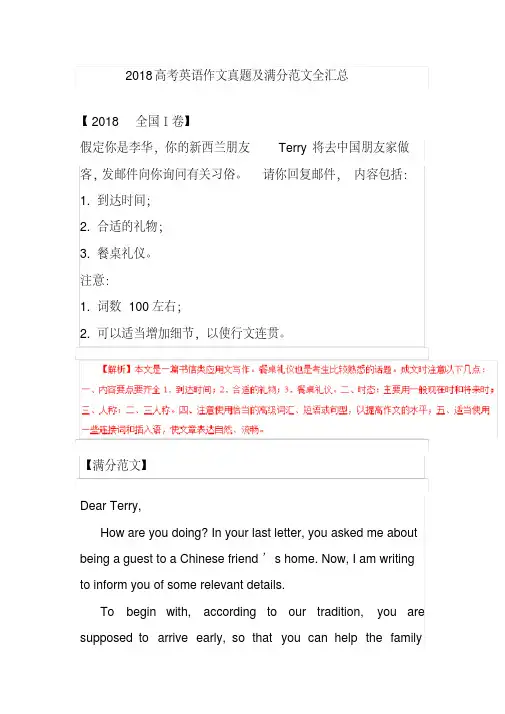
2018高考英语作文真题及满分范文全汇总【2018·全国Ⅰ卷】假定你是李华,你的新西兰朋友Terry将去中国朋友家做客,发邮件向你询问有关习俗。
请你回复邮件,内容包括:1. 到达时间;2. 合适的礼物;3. 餐桌礼仪。
注意:1. 词数100左右;2. 可以适当增加细节,以使行文连贯。
【满分范文】Dear Terry,How are you doing? In your last letter, you asked me about being a guest to a Chinese friend’s home. Now, I am writing to inform you of some relevant details.To begin with, according to our tradition, you are supposed to arrive early, so that you can help the familyprepare the dinner, which is meaningful and interesting. Besides, you’d better bring some gifts, like a book or a Chinese knot. What’s more, when you are enjoying the meal, you need to avoid making noises while chewing food.Hopefully, these suggestions would be helpful for you. I have the confidence that you will have a great time.Best wishes!Yours,Li Hua【2018·全国Ⅱ卷】你受学生会委托为校宣传栏“英语天地”写一则通知,请大家观看一部英语短片Growing Together,内容包括:1. 短片内容:学校的发展;2. 放映时间、地点;3. 欢迎对短片提出意见。
专题04 2018年全国卷II-五年真题完形填空重点词汇和长难句回顾 变式练-备考2022高考英语
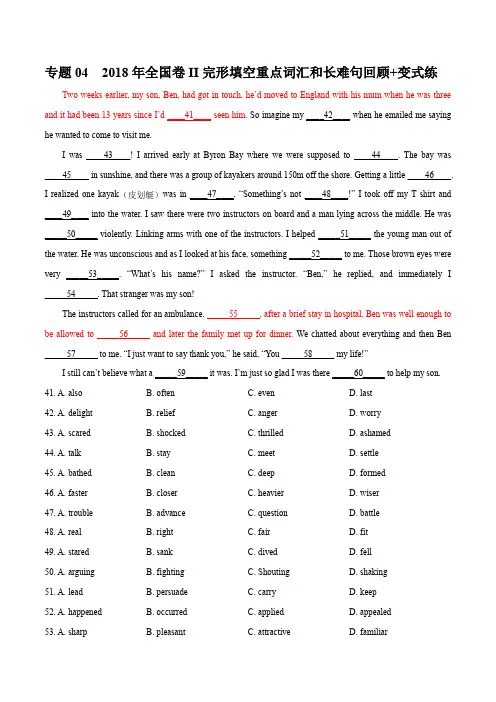
专题04 2018年全国卷II完形填空重点词汇和长难句回顾+变式练Two weeks earlier, my son, Ben, had got in touch, he’d moved to England with his mum when he was three and it had been 13 years since I’d ____41____ seen him. So imagine my ____42____ when he emailed me saying he wanted to come to visit me.I was ____43____! I arrived early at Byron Bay where we were supposed to ____44____. The bay was ____45____ in sunshine, and there was a group of kayakers around 150m off the shore. Getting a little ____46____.I realized one kayak(皮划艇)was in ____47____. “Something’s not ____48____!” I took off my T-shirt and ____49____ into the water. I saw there were two instructors on board and a man lying across the middle. He was _____50_____ violently. Linking arms with one of the instructors. I helped _____51_____ the young man out of the water. He was unconscious and as I looked at his face, something _____52_____ to me. Those brown eyes were very _____53_____. “What’s his name?” I asked the instructor. “Ben,” he replied, and immediately I _____54_____. That stranger was my son!The instructors called for an ambulance. _____55_____, after a brief stay in hospital, Ben was well enough to be allowed to _____56_____ and later the family met up for dinner. We chatted about everything and then Ben _____57_____ to me. “I just want to say thank you,” he said, “You _____58_____ my life!”I still can’t believe what a _____59_____ it was. I’m just so glad I was there _____60_____ to help my son.41. A. also B. often C. even D. last42. A. delight B. relief C. anger D. worry43. A. scared B. shocked C. thrilled D. ashamed44. A. talk B. stay C. meet D. settle45. A. bathed B. clean C. deep D. formed46. A. faster B. closer C. heavier D. wiser47. A. trouble B. advance C. question D. battle48. A. real B. right C. fair D. fit49. A. stared B. sank C. dived D. fell50. A. arguing B. fighting C. Shouting D. shaking51. A. lead B. persuade C. carry D. keep52. A. happened B. occurred C. applied D. appealed53. A. sharp B. pleasant C. attractive D. familiar54. A. agreed B. hesitated C. doubted D. knew55. A. Fortunately B. Frankly C. Sadly D. Suddenly56. A. return B. relax C. speak D. leave57. A. joked B. turned C. listened D. pointed58. A. created B. honored C. saved D. guided59. A. coincidence B. change C. pity D. pain60. A. on board B. in time C. for sure D. on purpose1.重点词汇1.appeal vi.呼吁;恳请;有吸引力;有感染力;引起兴趣;上诉;诉诸;诉请裁决;诉诸裁判(以宣布击球员出局);质疑裁判判决;vt.对…提出上诉2.hesitate vi.犹豫;踌躇;迟疑;(讲话)吞吞吐吐,结巴,支吾;3.coincidence n.巧合;巧事;相符;相一致; by coincidence 巧合4. ashamed adj.感到惭愧的;感到害臊的; shameful 令人羞愧的.5. thrilled adj.欣喜若狂的;异常兴奋的;非常开心的;非常高兴的;2.长难句1. Two weeks earlier, my son, Ben, had got in touch, he’d moved to England with his mum when he was three and it had been 13 years since I’d last seen him.整句译文:早在两周前我的儿子最终取得了联系。
高考真题完形填空 2018全国卷1、2 二次开发 讲义 2022届高考英语复习
2018 全国卷1 王君胜整编During my second year at the city college, I was told that the education department was offering a “free” course, called Thinking Chess, for three credits. I 41. the idea of taking the class because, after all, who doesn’t want to 42. a few dollars? More than that, I’d always wanted to learn chess. And even if I weren’t 43. enough about free credits, news about our 44. was appealing enough to me. He was an international grandmaster, which 45. I would be learning from one of the game’s 46. I could hardly wait to 47. him.Maurice Ashley was kind and smart, a former graduate returning to teach, and this 48. was no game for him; he meant business. In his introduction, he made it 49. that our credits would be hard-earned. In order to 50. the class among other criteria, we had to write a paper on how we plan to 51. what we would learn in class to our future professions and 52. to our lives.I managed to get an A in that 53. and learned life lessons that have served me well beyond the54. .Ten years after my chess class with Ashley, I’m still putting to use what he 55. me: “the absolute most important 56. that you learn when you play chess is how to make good 57.. On every single move you have to 58. a situation, process what your opponent (对手) is doing and 59. the best move from among all your options.” These words still ring true today in my 60. as a journalist.41. A. put forward B. jumped at C. tried out D. turned down42. A. waste B. earn C. save D. pay43. A. excited B. worried C. moved D. tired44. A. title B. competitor C. textbook D. instructor45. A. urged B. demanded C. held D. meant46. A. fastest B. easiest C. best D. rarest47. A. interview B. meet C. challenge D. beat48. A. chance B. qualification C. honor D. job49. A. real B. perfect C. clear D. possible50. A. attend B. pass C. skip D. observe51. A. add B. expose C. apply D. compare52. A. eventually B. naturally C. directly D. normally53. A. game B. presentation C. course D. experiment4054. A. criterion B. classroom C. department D. situation55. A. taught B. wrote C. questioned D. promised56. A. fact B. step C. manner D. skill57. A. grades B. decisions C. impressions D. comments58. A. analyze B. describe C. rebuild D. control59. A. announce B. signal C. block D. evaluate60. A. role B. desire C. concern D. behavior46-50 CBDCB 51-55 CACBA 56-60 DBADA答案:41-45 BCADD文章大意:本文是一篇记叙文,讲述的是作者通过大学选修“思维象棋”课程而产生的人生感悟。
2018年高考英语全国2卷真题及答案(word版) 含写作和详细解析
2018年普通高等学校招生全国统一考试(卷2)英语(考试时间:120分钟试卷满分:150分)注意事项:1. 答卷前,考生务必将自己的姓名、准考证号填写在答题卡上。
2. 作答时,务必将答案写在答题卡上,写在本试卷及草稿纸上无效。
3. 考试结束后,将本试卷和答题卡一并交回。
第一部分听力(共两节,满分30分)做题时,先将答案标在试卷上。
录音内容结束后,你将有两分钟的时间将试卷上的答案转涂到答题卡上。
第一节(共5小题;每小题1.5分,满分7.5分)听下面5短对话,每段对话后有一个小题,从题中给的A、B、C三个选项中选出最佳选项。
听完每段对话后,你都有10秒钟的时间来回答有关小题和阅读下一小题。
每段对话仅读一遍。
例:How much is the shirt?A.£19.15.B.£9.18.C.£9.15.1.What does John find difficult in learning German?A.Pronunciation.B.Vocabulary.C.Grammar.2.What is the probable relationship between the speakers?A.Colleagues.B.Brother and sister.C.Teacher and student.3.Where does the conversation probably take place?A. In a bank.B. At a ticket office.C. On a train.4. What are the speakers talking about?A.A restaurant.B.A street.C.A dish.5.What does the woman think of her interview?A.It was tough.B.It was interesting.C.It was successful.第二节(共15小题;每小题1.5分,满分22.5分)听下面5段对话或独白,每段对话或独白后有几个小题,从题中所给的A、B、C三个选项中选出最佳选项。
102 英语高考“七选五”阅读理解真题详解2
2020高考英语“七选五”阅读理解专项突破原创系列资料102 英语高考“七选五”阅读理解真题详解22018全国卷Ⅱ【高考真题解题例析】为了让大家能把上面所提到的解题原则、方法和步骤能运用到具体的解题实践之中,下面以2018年英语高考全国卷Ⅱ中的“七选五”阅读理解试题的解答为例来说明如何解题。
【高考真题】根据短文内容,从短文后的选项中选出能填入空白处的最佳选项。
选项中有两项为多余选项。
If you are already making the time to exercise, it is good indeed! With such busy lives, it can be hard to try and find the time to work out. 36 Working out in the morning provides additional benefits beyond being physically fit.●Your productivity is improved. Exercising makes you more awake and ready to handle whatever is ahead of you for the day. 37●Your metabolism(新陈代谢) gets a head start. 38 If you work out in the mornings, then you will be getting the calorie (卡路里) burning benefits for the whole day, not in your sleep.●39 Studies found that people who woke up early for exercise slept better than those who exercised in the evening. Exercise energizes you, so it is more difficult to relax and have a peaceful sleep when you are very excited.●40 If you work out bright and early in the morning, you will be more likely to stick to healthy food choices throughout the day. Who would want to ruin their good workout by eating junk food? You will want to continue to focus on positive choices.There are a lot of benefits to working out, especially in the mornings. Set your alarm clock an hour early and push yourself to work out! You will feel energized all day long.A. You will stick to your diet.B. Your quality of sleep improves.C. You prefer healthy food to fast food.D. There is no reason you should exercise in the morning.E. You can keep your head clear for 4-10 hours after exercise.F. After you exercise, you continue to burn calories throughout the day.G. If you are planning to do exercise regularly, or you’re doing it now, then listen up!【解题过程】第一步,快速浏览文章与选项,判定语篇类型、主题语境和篇章结构。
2018江苏英语高考真题(含解析)
2018年普通高等学校招生全国统一考试英语(江苏卷)第一部分听力(共两节,满分30分)做题时,先将答案标在试卷上。
录音内容结束后,你将有两分钟的时间将试卷上的答案转涂到答题卡上。
第一节(共5小题;每小题1.5分,满分7.5分)听下面5段对话。
每段对话后有一个小题,从题中所给的A、B、C三个选项中选出最佳选项。
听完每段对话后,你都有10秒钟的时间来回答有关小题和阅读下一小题。
每段对话仅读一遍。
例:How much is the shirt?A. £ 19. 15.B. £ 9. 18.C. £ 9. 15.答案是C。
1.What will James do tomorrow ?A.Watch a TV program.B.Give a talk.C.Writea report.2.What can we say about the woman?A.She's generour.B.She's curious.C.She's helpful.3.When does the train leave?A.At 6:30.B.At8:30.C.At 10:30.4.How does the woman go to work?A.By car.B.On foot.C.By bike5.What is the probable relationship between the speakers?A.Classmates.B.Teacher and student.C.Doctor and patient.第二节(共15小题;每小题1.5分,满分22.5分)听下面5段对话或独白。
每段对话或独白后有几个小题,从题中所给的A、B、C三个选项中选出最佳选项。
听每段对话或独白前,你将有时间阅读各个小题,每小题5秒钟;听完后,各小题将给出5秒钟的作答时间。
每段对话或独白读两遍。
- 1、下载文档前请自行甄别文档内容的完整性,平台不提供额外的编辑、内容补充、找答案等附加服务。
- 2、"仅部分预览"的文档,不可在线预览部分如存在完整性等问题,可反馈申请退款(可完整预览的文档不适用该条件!)。
- 3、如文档侵犯您的权益,请联系客服反馈,我们会尽快为您处理(人工客服工作时间:9:00-18:30)。
2018年普通高等学校招生全国统一考试(全国II卷)英语注意事项:1. 答卷前,考生务必将自己的姓名、准考证号填写在答题卡上。
2. 回答选择题时,选出每小题答案后,用铅笔把答题卡上对应题目的答案标号涂黑。
如需改动,用橡皮擦干净后,再选涂其他答案标号。
回答非选择题时,将答案写在答题卡上,写在本试卷上无效。
3. 考试结束后,将本试卷和答题卡一并交回。
第一部分听力(共两节,满分30分)做题时,先将答案标在试卷上。
录音内容结束后,你将有两分钟的时间将试卷上的答案转涂到答题卡上。
第一节(共5小题;每小题 1.5分,满分7.5分)听下面5段对话。
每段对话后有一个小题,从题中所给的A、B、C三个选项中选出最佳选项。
听完每段对话后,你都有10秒钟的时间来回答有关小题和阅读下一小题。
每段对话仅读一遍。
例:How much is the shirt?A. £19. 15.B. £9. 18.C. £9. 15.答案是C。
1. What does John find difficult in learning German?A. Pronunciation.B. Vocabulary.C. Grammar.2. What is the probable relationship between the speakers?A. Colleagues.B. Brother and sister.C. Teacher and student.3. Where does the conversation probably take place?A. In a bank.B. At a ticket office.C. On a train.4. What are the speakers talking about?A. A restaurant.B. A street.C. A dish.5. What does the woman think of her interview?A. It was tough.B. It was interesting.C. It was successful.第二节(共15小题;每小题 1.5分,满分22.5分)听下面5段对话或独白。
每段对话或独白后有几个小题,从题中所给的A、B、C三个选项中选出最佳选项。
听每段对话或独白前,你将有时间阅读各个小题,每小题5秒钟;听完后,各小题将给出5秒钟的作答时间。
每段对话或独白读两遍。
听第6段材料,回答第6、7题。
6. When will Judy go to a party?A. On Monday.B. On Tuesday.C. On Wednesday.7. What will Max do next?A. Fly a kite.B. Read a magazine.C. Do his homework.听第7段材料,回答第8、9题。
8. What does the man suggest doing at first?A. Going to a concert.B. Watching a movie.C. Playing a computer game.9.What do the speakers decide to do?A. Visit Mike.B. Go boating.C. Take a walk.听第8段材料,回答第10至12题。
10. Which color do cats see better than humans?A. Red.B. Green.C. Blue.11. Why do cats bring dead birds home?A. To eat them in a safe place.B. To show off their hunting skills.C. To make their owners happy.12. How does the man sound at the end of the conversation?A. Grateful.B. Humorous.C. Curious.听第9段材料,回答第13至16题。
13. Who is Macy?A. Ed’s mother.B. Ed’s teacher.C. Ed’s friend.14. How does Ed usually go to kindergarten?A. By car.B. On foot.C. By bus.15. What does Ed enjoy doing at the kindergarten?A. Telling stories.B. Singing songs.C. Playing with others.16. What do the teachers say about Ed?A. He’s clever.B. He’s quiet.C. He’s brave.听第10段材料,回答第17至20题。
17. At what age did Emily start learning ballet?A. Five.B. Six.C. Nine.18. Why did Emily move to Toronto?A. To work for a dance school.B. To perform at a dance theater.C. To learn contemporary dance.19. Why did Emily quit dancing?A. She was too old to dance.B. She failed to get a scholarship.C. She lost interest in it.20. How does Emily feel about stopping training?A. She’s pleased.B. She’s regretful.C. She’s upset.第二部分阅读理解(共两节,满分40分)第一节(共15小题;每小题2分,满分30分)阅读下列短文,从每题所给的A、B、C和D四个选项中,选出最佳选项。
ASummer ActivitiesStudents should read the list with their parents / carers, and select two activities they would like to do. Forms will be available in school and online for them to indicate their choices and return to school. Before choices are finalised, parents / carers will be asked to sign to confirm their child’s choices.Activity Description Memberof staffCostOutdoor Adventure(OUT) Take yourself out of your comfort zone for a week, discovernew personal qualities, and learn new skills. You will beMr. Clemens £140able to take part in a number of activities from canoeing to wild camping on Dartmoor. Learn rock climbing and work as a team, and enjoy the great outdoor environment.WWI Battlefields and Paris (WBP) On Monday we travel to London. After staying overnight inLondon, we travel on Day 2 to northern France to visit theWorld War I battlefields. On Day 3 we cross into Belgium.Thursday sees us make the short journey to Paris where wewill visit Disneyland Paris park, staying until late to see theparade and the fireworks. Our final day, Friday, sees us visitcentral Paris and tour the main sights.Mrs. Wilson £425Crafty Foxes (CRF) Four days of product design centred around textiles.Making lovely objects using recycled and made materials.Bags, cushions and decorations … Learn skills and leavewith modern and unusual textiles.Mrs. Goode £30Potty about Potter(POT) Visit Warner Bros Studio, shop stop to buy picnic, stayovernight in an approved Youth Hostel inStreatley-on-Thames, guided tour of Oxford to see the filmlocations, picnic lunch outside Oxford’s Christchurch,boating on the River Cherwell through the University Parks,before heading back to Exeter.Miss Drake £15021. Which activity will you choose if you want to go camping?A. OUT.B. WBP.C. CRF.D. POT.22. What will the students do on Tuesday with Mrs. Wilson?A. Travel to London.B. See a parade and fireworks.C. Tour central Paris.D. Visit the WWI battlefields.23. How long does Potty about Potter last?A. Two days.B. Four days.C. Five days.D. One week.BMany of us love July because it’s the month when nature’s berries and stone fruits are in abundance. These and sweet jewels from British Co lumbia’s fields are little powerhouses of nutritional protection.Of the common berries, strawberries are highest in vitamin C, although, because of their seeds, raspberries contain alittle more protein (蛋白质), iron and zinc (not that fruits have much protein). Blueberries are particularly high in antioxidants (抗氧化物质). The yellow and orange stone fruits such as peaches are high in the carotenoids we turn intovitamin A and which are antioxidants. As for cherries (樱桃), they are so delicious who cares? However, they are rich invitamin C.When combined with berries or slices of other fruits, frozen bananas make an excellent base for thick, cooling fruitshakes and low fat “ice cream”. For this purpose, select ripe bananas for freezing as they are much sweeter.Remove theskin and place them in plastic bags or containers and freeze. If you like, a squeeze of fresh lemon juice on the bananas willprevent them turning brown. Frozen bananas will last several weeks, depending on their ripeness and the temperature of the freezer.If you have a juicer, you can simply feed in frozen bananas and some berries or sliced fruit. Out comes a “soft-serve” creamy dessert, to be eaten right away. This makes a fun activity for a children’sparty; they love feeding the fruit andfrozen bananas into the top of the machine and watching the ice cream come out below.24. What does the author seem to like about cherries?A. They contain protein.B. They are high in vitamin A.C. They have a pleasant taste.D. They are rich in antioxidants.25. Why is fresh lemon juice used in freezing bananas?A. To make them smell better.B. To keep their colour.C. To speed up their ripening.D. To improve their nutrition.26. What is “a juicer” in the last paragraph?A. A dessert.B. A drink.C. A container.D. A machine.27. From which is the text probably taken?A. A biology textbook.B. A health magazine.C. A research paper.D. A travel brochure.CTeens and younger children are reading a lot less for fun, according to a Common Sense Media report published Monday.While the decline over the past decade is steep for teen readers, some data in the report shows that reading remains a bigpart of many children’s lives, and indicates how parents might help encourage more reading.比例) who say they ‘hardly ever’ read for fun has gone from According to the report’s key findings, “the proportion (percent of 13-year-olds and 9 percent of 17-year-olds in 1984 to 22 percent and 27 percent respectively today.”The report data shows that pleasure reading levels for younger children, ages 2-8, remain largely the same. But theamount of time spent in reading each session has declined, from closer to an hour or more to closer to a half hour per session.When it comes to technology and reading, the report does little to counsel (建议) parents looking for data about theeffect of e-readers and tablets on reading. It does point out that many parents still limit electronic reading, mainly due toconcerns about increased screen time.The most hopeful data shared in the report shows clear evidence of parents serving as examples and important guidesfor their kids when it comes to reading. Data shows that kids and teens who do read frequently, compared to infrequentreaders, have more books in the home, more books purchased for them, parents who read more often, and parents who setaside time for them to read.As the end of school approaches, and school vacation reading lists loom (逼近) ahead, parents might take this chance tostep in and make their own summer reading list and plan a family trip to the library or bookstore.28. What is the Common Sense Media report probably about?A. Children’s reading habits.B. Quality of children’s books.-class activities. D. Parent-child relationships.C. Children’s after29. Where can you find the data that best supports “children are reading a lot less for fun”?A. In paragraph 2.B. In paragraph 3.C. In paragraph 4.D. In paragraph 5.30. Why do many parents limit electronic reading?A. E-books are of poor quality.B. It could be a waste of time.D. E-readers are expensive.C. It may harm children’s health.31. How should parents encourage their children to read more?A. Act as role models for them.B. Ask them to write book reports.C. Set up reading groups for them.D. Talk with their reading class teachers.DWe’ve a ll been there: in a lift, in line at the bank or on an airplane, surround ed by people who are, like us, deeplyfocused on their smartphones or, worse, struggling with the uncomfortable silence.What’s the problem? It’s possible that we all have compromised conversational intelligence. It’us start a conversation because it’s awkward and challenging, or we think it’s annoying and unnecessary. Buiceyou find yourself among strangers, consider that small talk is worth the trouble. Experts say it’s that results in big benefits.Dismissing small talk as unimportant is easy, but we can’t forget that deep relationships wouldnfor casual conversation. Small talk is the grease (润滑剂) for social communication, says Bernardo Carducci, director of theShyness Research Institute at Indiana University Southeast. “Almost e very great love story and each big business dealhe explains. “The key to successful small talk is learning how to connect with others, not justbegins with small talk,” communicate w ith them.”In a 2014 study, Elizabeth Dunn, associate professor of psychology at UBC, invited people on their way into a coffeeshop. One group was asked to seek out an interaction (互动) with its waiter; the other, to speak only when necessary. Theresults showed that those who chatted with their server reported significantly higher positive feelings and a better coffeethshop experience. “It’s not that talking to the waiter is better than talking to your husband,” sa peripheral (边缘的) members of our social network matter for our well-being also.”Dunn believes that people who reach out to strangers feel a significantly greater sense of belonging, a bond with others. Carducci believes developing such a sense of belonging starts with small talk. “Small talk is the basis of good manners, says.32. What phenomenon is described in the first paragraph?A. Addiction to smartphones.B. Inappropriate behaviours in public places.C. Absence of communication between strangers.D. Impatience with slow service.33. What is important for successful small talk according to Carducci?A. Showing good manners.B. Relating to other people.C. Focusing on a topic.D. Making business deals.34. What does the coffee-shop study suggest about small talk?A. It improves family relationships.B. It raises people’s confidence.C. It matters as much as formal talk.D. It makes people feel good.35. What is the best title for the text?A. Conversation CountsB. Ways of Making Small TalkC. Benefits of Small TalkD. Uncomfortable Silence第二节(共5小题;每小题2分,满分10分)根据短文内容,从短文后的选项中选出能填入空白处的最佳选项。
